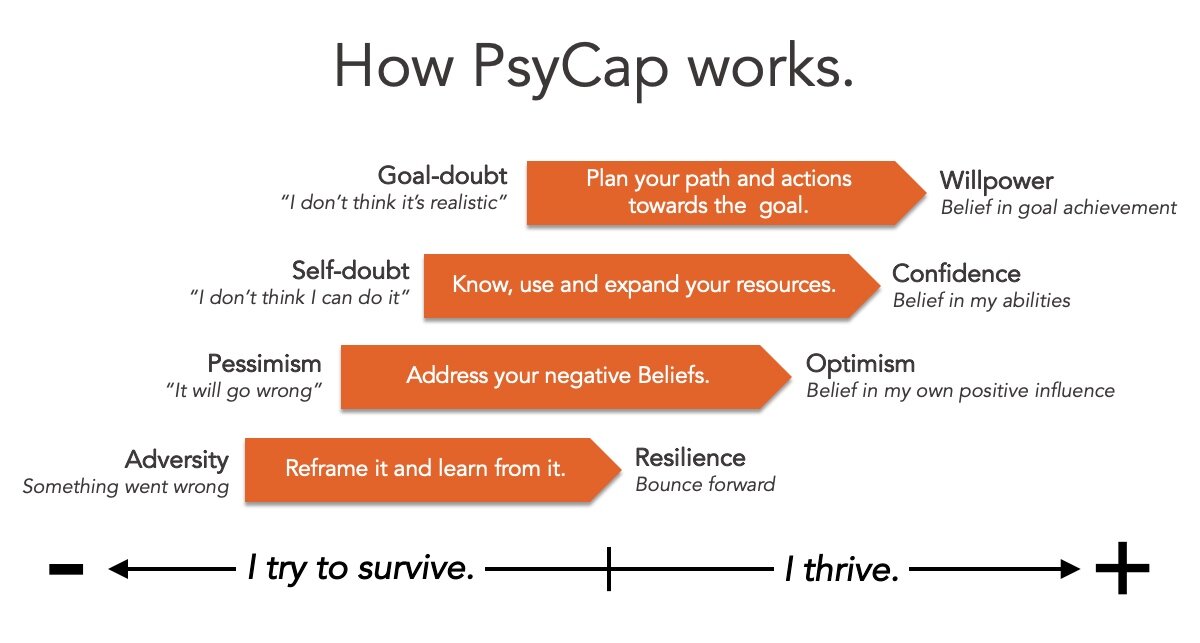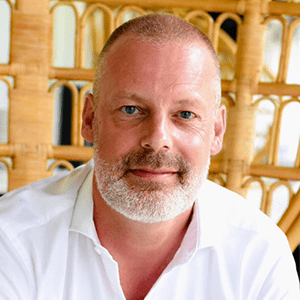To move the organization from surviving to thriving, middle managers are now more important than senior leaders. As they are closer to the workforce through their daily interactions, middle managers can directly influence and support employees to thrive anew.
Not all employees thrive in the “new normal”, and for some it is difficult to overcome the fatigue and worries of the last months. They need a “leg up” to build the energy and courage they need to move ahead.
The Roles of Middle Managers.
Sandwiched between the executive leadership’s strategic vision, high performance expectations, and the day-to-day challenges of executing this with the operational colleagues, middle managers have several vital roles: Bridge-builders, explainers, energisers, and enablers.
Middle managers are often faced with the practical question of “How do I do it?” I believe this is where the often ignored Psychological Capital (or PsyCap) construct, and a shift towards an enabling leadership mindset, can be helpful.
A Mindset of Enablement.
I will use the spartan obstacle course runners to illustrate an enabling mindset. Giving someone a leg up is an offer of support, which only works when the runners collaborate. It requires the receiving person to actively engage and to put effort into the moment. In contrast, “pulling or pushing someone up” puts almost all the effort on the helper.
As a middle manager, you can use a similar approach with your people by:
- Being connected: Check in regularly what your people feel and what they need
- Being involved: Get your hands dirty, not staying only at the surface of problems.
- Having empathy: See the obstacles from your people’s perspective, and not only in terms of the strategy directions you receive from above
- Inspiring: Show them your challenges, and how you approach them
- Motivating: Encourage and build their sense of confidence
Building Psychological Capital.
The PsyCap construct offers a simple and powerful “map” that can guide middle managers efforts to enable their people to grow through building their resources of resilience, optimism, confidence and willpower. I view PsyCap as the building blocks of the elusive Growth Mindset, that for many is a fuzzy aspiration.
PsyCap is “an individual’s positive psychological state of development” (F. Luthans, 2007) that is characterised by having high levels of Willpower, Confidence, Resilience, and Optimism. As PsyCap is both measurable and developable, it is in a way a reflection of who you are and what you can become.
Practically speaking, middle managers can enable their employees to build more resilience, optimism, confidence and willpower through a set of interventions.

A Step-By-Step Approach.
1 – Build resilience and overcome adversity:
- Support the employee to identify what went wrong, what it taught them, and what they will do differently next time
- Support them to focus on their efforts, rather than comparing themselves with the goal
- Remember this: “Resilience” is only the beginning of a process.
2 – Build optimism and overcome pessimistic thinking:
- Support your employee to identify what they are worried about, leave their negative beliefs behind them, and help them to reframe and overcome their concerns
- Support employees to appreciate their strengths and resources, and create ways for them to better utilise those assets
- Remember this: “Optimism” is a process, not something that can be “switched on”.
3 – Build confidence and overcome self-doubt:
- Support employees to re-connect with their goal, rediscover why this is important to them, and look for past experiences where they successfully mastered a tough challenge
- Support employees to build positive emotional energy through encouragement, and reinforce their strengths and importance
- Remember this: “Confidence” is a fuel that needs regular top-up
4 – Build willpower and achieve goals.
- Support employees to draw up a path towards the goal, foresee obstacles, and line up potential solutions and required resources
- Support them to use positive vocabulary, to focus on what they can really influence, and help them to preserve their energy
- Remember this: “Willpower” is a finite but rechargeable resource
Psycap and Organisational Development.
Through our development work with organisations, we experience that middle manager’s awareness of, and the application of, Psychological Capital construct is powerful for many individual and organisational indicators. A meta-study (Avey, 2011) identified that a higher level of PsyCap can have up-to 24% positive effect on Anxiety, Stress, Positive Mood, Motivation, Empathy, Collaboration and Goal Achievement.
PsyCap can be used as a framework to intentionally focus on people development interactions, instead of merely pushing employees to increase their performance. In this article we have condensed some of our practical interventions, and we invite you to reach out for a conversation about how PsyCap can support your organization.
OK, Senior leaders are of course not unimportant, and in reality the move from surviving to thriving is hugely dependent on senior leaders mindset and actions. But without the middle managers, this is not going to work.
So what does a mentally healthy workplace look and feel like? It’s not necessarily about having beanbags and table tennis at work! Some of the key similarities amongst mentally healthy organisations include factors such as:
This article is first published here.
We have launched a Positive Leadership masterclass series, where we will go straight to the core of what make leaders impactful. We focus on practical high challenge and high support methods that you can immediately bring into your leadership practice.
For inquiries, please contact bernie@positivepsych.edu.sg.
Henrik Kofod-Hansen has more than 20 years of experience as a corporate executive and senior leader in Asia and Europe, during which he experienced the insufficiency of traditional company cultures, leadership, and development strategies. To enable better leadership and organisational thriving, he dedicated himself to utilising the science and interventions within positive organisational psychology to enable better leadership and organisational thriving. Henrik holds an MSc of Applied Positive Psychology and advanced degrees in Organisational Psychology & Leadership, as well as in Psychotherapy and Counselling. He is an experienced and trained Co-active® coach, and an Organisational Relationship Systems Coach®.



